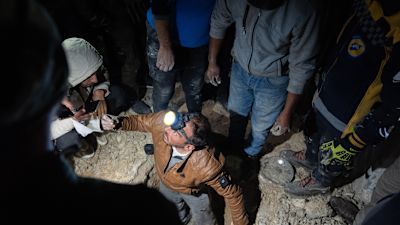'They've heard noises': Search underway for 'thousands' underneath Syria's 'slaughterhouse' prison

Search teams have asked for international help as they struggle to free prisoners trapped in cells in Syria's notorious prison, ITV News International Editor Emma Murphy reports from Sednaya prison in Damascus
Search teams have heard noises and believe thousands of people are trapped in underground cells in the notorious Sednaya prison in Syria.
As the insurgents swept across Syria in just ten days to bring an end to the Assad family’s 50-year rule, they broke into prisons and security facilities to free political prisoners and many of the tens of thousands of people who disappeared since the conflict began back in 2011.
Female prisoners reportedly screamed with relief as they were released from the feared prison - dubbed the "human slaughterhouse".
It comes after rebel forces led by Abu Mohammed al-Golani toppled President Bashar al-Assad's regime over the weekend.
ITV News International Editor Emma Murphy, who is at Sednaya prison, says search teams are pleading for international support to help free those trapped underground.
She said: "They understand thousands may be beneath in basement cells. They've heard noises, they believe people are there and now it's just a matter of trying to find them. It's understood some of the doors are controlled by codes, so they aren't able to get in.
"They're pleading for international help to support the White Helmets, who are used to rescuing people from rubble and buildings here over the whole of the civil war. They're asking for the international community to send people to help them find those who are locked beneath this building."
Videos shared on social media over the weekend showed prisoners being freed by rebels who had to reassure those inside it was safe to leave.
One of the rebels said as he tried to rush streams of women out of Sednaya, “Don’t be afraid … Bashar Assad has fallen! Why are you afraid?”
Videos appear to show women being released freed from Sednaya prison by rebel forces
Amnesty International said Assad's forces "quietly and methodically" committed "crimes of humanity", allegedly executing dozens of people weekly in Sednaya. It is estimated that up to 13,000 Syrians were killed between 2011 and 2016.
The organisation has also reported claims of rape at the facility.
Videos on social media showed dozens of prisoners, including children, running barefoot on the streets of Damascus after they were released.
Among those released was Bashar Bashoum, a 63-year-old writer who was due to be executed on Sunday.
“I haven’t seen the sun until today,” Barhoum told The Associated Press after walking through the streets.
“Instead of being dead tomorrow, thank God, he gave me a new lease of life.”
Unable to find his phone or belongings in the prison, Barhoum set off to find a way to let his wife and daughters know he is alive and safe.
Tens of thousands of detainees have so far been freed, Rami Abdurrahman of the Syrian Observatory for Human Rights, a British-based pro-opposition war monitor, said.
Rebels have also freed prisoners from other Syrian cities, including Aleppo, Homs, and Hama.
Torture, executions and starvation in Syria's prisons
Syria's prisons are infamous for claims of systematic torture, disease and starvation, by human rights groups, whistleblowers, and former detainees.
In 2013, a Syrian military defector, known as Caesar, smuggled out more than 53,000 photographs, which human rights groups say provide clear evidence of the horrific conditions in the country's prisons.
Syria’s security forces and prisons were not only used to isolate Assad’s opponents but also to instil fear among his own people, Lina Khatib, an Associate Fellow at the London think tank Chatham House said.
"Anxiety about being thrown in one of Assad’s notorious prisons created wide mistrust among Syrians,” Khatib said.
“Assad nurtured this culture of fear to maintain control and crush political opposition."
Omar Alshogre, who was detained for three years and survived relentless torture, watched in awe from his home far from Syria as videos showed dozens of detainees fleeing.
“A hundred democracies in the world had done nothing to help them, and now a few military groups came down and broke open prison after prison,” Alshogre, a human rights advocate who now resides in Sweden and the U.S.
Subscribe free to our weekly newsletter for exclusive and original coverage from ITV News. Direct to your inbox every Friday morning.
Have you heard The Trapped? Listen as Daniel Hewitt exposes the UK's dirty secret.